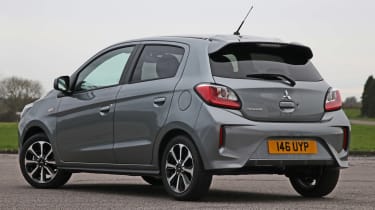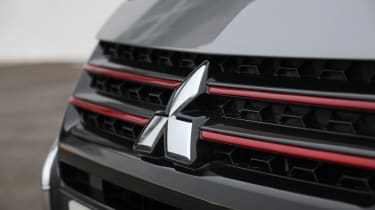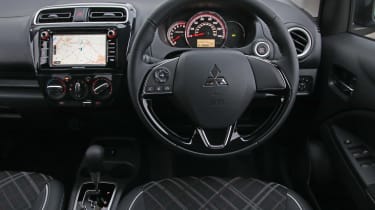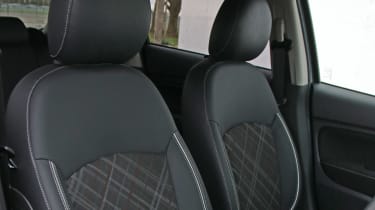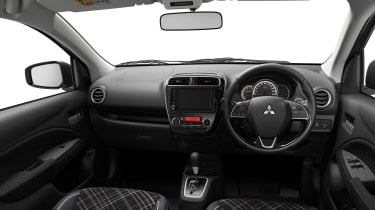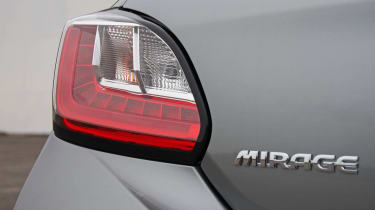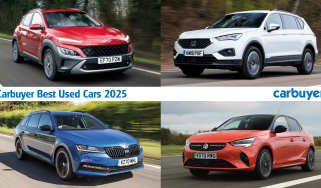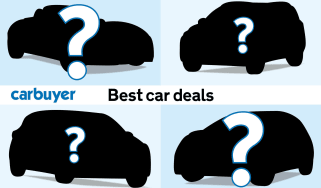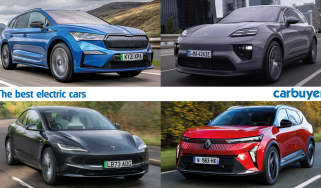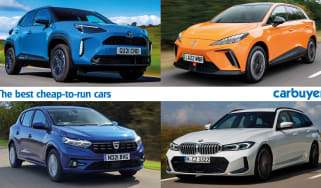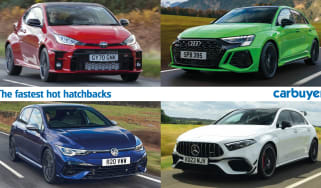Mitsubishi Mirage hatchback review (2012-2021)
"The Mitsubishi Mirage is well-equipped and cheap to run, but compared to the competition, it’s expensive to buy and not enjoyable to drive"
Pros
- Low running costs
- Fairly well equipped
- Decent interior space
Cons
- Lacks modern features
- Not great to drive
- Expensive compared to rivals
The Mitsubishi Mirage is a compact hatchback that fits somewhere between a Ford Ka+ and Ford Fiesta in terms of size. It's smaller than a supermini but slightly larger than a city car, and you might find its halfway-house approach is exactly what you need. For the 2020 model year, the Mirage received an in-depth facelift with revised styling and updated technology.
Every model is well equipped, though the Toyota Aygo and MG 3 can be bought for less money, the Mirage offers even more space inside than supermini rivals such as the Hyundai i10 and Kia Picanto.
Best small cars and superminis you can buy now
The Mirage’s interior has plenty of bells and whistles, but the quality of materials is underwhelming and the overall ambiance is comparable to a car from a few years ago. The driving experience is also disappointing: the Mirage has soft suspension, which ought to protect you well from poor road surfaces. Unfortunately, though, potholes and cat’s eyes cause the car to jiggle about unpleasantly and it also leans noticeably when cornering.
On a more positive note, the Mirage is cheap to run: its 1.2-litre engine makes up for lacklustre performance by returning up to 56.5mpg with the manual gearbox, or up to 50.4mpg with the automatic transmission. Standard equipment is impressively generous across the three trim levels: the long list of kit includes air-conditioning, keyless entry and go, all-round electric windows, rear parking sensors, alloy wheels, heated front seats and bright xenon lights. Higher trim-level models get an updated infotainment system with Apple CarPlay and Android Auto Smartphone connectivity. In the supermini class, few cars are as well equipped as this – although the Mirage’s comparably high starting price means it’s no bargain.
More reviews
In-depth reviews
Originally available as a three or five-door hatchback and with 1.0 or 1.2-litre petrol engines, the Mirage is now a 1.2-litre five-door only, meaning there’s no cheap entry-level model. Mitsubishi’s five year warranty is generous but as yet, the updated Mirage has not been tested by Euro NCAP.
MPG, running costs & CO2
Even under the more stringent new WLTP testing, the Mirage’s strongest suit is still its fuel economy. The 1.2-litre petrol engine returns up to 56.5mpg and CO2 emissions ranging from 113-127g/km depending on specification. These impressive efficiency numbers are made possible by its use of low-friction tyres and a stop-start system.
After the first year's CO2-based road tax (generally included in the on-the-road price), every version of the Mitsubishi Mirage costs the standard yearly rate in tax.
Servicing
Servicing should be cheap and needs to be done annually or every 12,500 miles (whichever comes first), while Mitsubishi’s five-year/62,500-mile warranty matches the five years offered with the Hyndai i10.
Engines, drive & performance
It’s okay for superminis to feel slightly out of their depth on a long motorway cruise (although the Volkswagen Up! manages this with aplomb), but they should excel in town. Unfortunately, the Mitsubishi Mirage is underwhelming to drive in almost any environment. On the motorway, it feels sluggish and underpowered, while on twisty backroads there’s too much body lean and in town – which should be its forte – you have to change gear very frequently, as the 1.2-litre engine struggles to keep pace.
The Mirage’s steering is also too light and offers little feedback, making it hard to judge how much grip the tyres have. This is all the more disappointing as those low-friction tyres, while great for economy, aren’t very grippy. If you need an automatic gearbox, you may wish to look elsewhere: the optional CVT automatic used in the Mirage is unpleasant and noisy, although in fairness, Mitsubishi isn’t the only carmaker to offer this type of transmission. Compared to the Kia Picanto, Hyundai i10 and Toyota Aygo though, the Mirage’s driving experience is distinctly unimpressive.
Interior & comfort
To give it its due, the Mitsubishi Mirage has comfortable front seats that are unlikely to give you backache on a long journey – although the rear seats feel a little flat and unsupportive. Nevertheless, there’s a decent amount of interior space, with reasonable legroom in the back. Taller passengers may wish for more rear headroom but, for a supermini, space is perfectly decent.
The Mirage’s dashboard is undeniably old-fashioned in its design, but it’s logically laid-out, simple to operate and feels reasonably well put-together. However, the quality of plastics used lags behind the competition. Another mark in the debit column is the suspension: potholes and broken tarmac cause too much noise and disruption, while take a corner too quickly and you can expect complaints from any passengers, as the Mirage leans and wallows unpleasantly in bends.
From 2020 onwards, the Mirage received a major facelift with revised styling and updated technology. Three trim levels are available, with the entry-level Verve model getting a long standard kit list including air conditioning, a leather steering wheel, Bluetooth, a height adjustable steering wheel and a rear spoiler. This version comes with 14-inch steel wheels helping it to achieve the best fuel economy in the range.
Step up to the Design trim level and you get 15-inch two-tone alloy wheels, red accents on the front grille, tinted rear windows and electric folding door mirrors. Interior upgrades include a height adjustable passenger seat and faux leather trimmed seats and gearlever. You also get an upgraded infotainment system with Apple CarPlay and Android Auto connectivity and keyless go and start.
The range-topping First Edition model adds LED headlights with daytime running lights and a chrome grille to the exterior. Other additions to the standard kit list include heated front seats, cruise control, climate control, rear parking sensors and front fog lights. As standard, Forward Collision Mitigation System (FCM) is also fitted, which brakes the car automatically to avoid a collision.
Practicality & boot space
As a purely practical proposition, the Mitsubishi Mirage acquits itself well. It doesn’t excel in any particular area, but headroom, legroom and boot space are all perfectly decent. Six-foot rear-seat passengers may wish for a couple more inches of head and elbowroom, but this is likely to be the case in any supermini.
Storage space is similarly reasonable: the Mirage has plenty of cubbyholes, pockets and doorbins, while the generous cup-holders should accommodate most travel mugs. Boot space is a competitive 235 litres –16 litres shy of what you get in the Skoda Citigo. The 60:40 split-folding rear seats can be dropped to increase the load area to 910 litres – again, perfectly reasonable, if about 10% down on the Citigo. The only negative is a high boot lip, which gets in the way when loading bulky items.
Reliability & safety
In our 2020 Driver Power customer satisfaction survey, Mitsubishi finished in 16th place out of 30 manufacturers with only 12.3% of owners reporting a fault in the first year. This indicates the firm has improved in terms of reliability and usability in recent years, after finishing 31st out of 32 manufacturers in our 2016 survey.
On a less positive note, Mitsubishi owners rate their cars poorly for handling and performance – areas where the Mirage noticeably underperforms. Still, the car’s five-year/62,500-mile warranty is generous and should stand owners in good stead. Too few Mirage owners participated in our 2020 survey for the model to be included in our results.
Safety is reasonable if not outstanding: the Mirage scored four stars out of five in its Euro NCAP crash tests at a time when many rivals were scoring the full five stars. Still, the Mirage’s 90% adult occupant protection score is excellent; it was most let down by a 55% result in the safety assistance category, partly due to the absence of a speed limiter and the lack of a seatbelt reminder for rear passengers.
Safety assistance has been improved on 2020 models. Optional (standard on the First Edition) Forward Collision Mitigation System (FCM) is Mitsubishi’s answer to Autonomous Emergency Braking (AEB), radars first warn the driver of a potential low-speed impact, finally braking the car automatically if the system senses no driver response. All Mirages come as standard with Active Stability Control (ASC) with Traction Control (TCL) and Electronic Brake-force Distribution (EBD).

